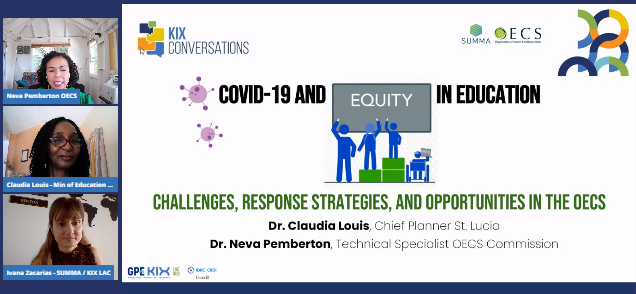
This article was submitted by the KIX LAC Hub and edited by the Global Partnership for Education Knowledge and Innovation Exchange (KIX).
On February 12, 2021, the KIX LAC hub hosted a KIX Conversations webinar on COVID-19 and Equity in Education. During this webinar, Ivana Zacarias, (Researcher for the KIX Project), interviewed Dr. Neva Pemberton, Specialist of the Educational Development Management Unit of the Organization of Eastern Caribbean States (OECS); and Dr. Claudia Louis, Head of the Planning Unit of the Ministry of Education of Saint Lucia and member of the KIX LAC hub. Together, they discussed the impact of COVID-19 on equity in education systems and the challenges, strategic responses and opportunities involved.
The impact of the pandemic on education providers has affected 1,149 institutions from early childhood to tertiary level, impacting 152,317 students and 10,859 teachers in the OECS territories. In reference to this, Dr. Pemberton emphasized that certain states in the Caribbean “have a relatively conducive legislative environment to implement initiatives to strengthen equity, but more emphasis needs to be placed on the inclusion of students with disabilities and other special educational needs, as there is insufficient data to make evidence-based decisions to strengthen equity in education, effective equity and inclusion planning is limited."
In response to this, Dr. Louis stated that "education during the pandemic exacerbates existing equity issues and presents new ones. With respect to the digital divide, students from low socioeconomic backgrounds and areas with limited connectivity are disproportionately affected."
The St. Lucia Ministry of Education, where Dr. Louis works, took action to address these issues by designing a response plan to improve equity in education, which includes an income support program for the newly unemployed; expansion of school welfare and psychosocial support programs; face-to-face assistance for students preparing for external examinations; distribution of devices and e-books to bridge the digital divide. The OECS Commission is also implementing a COVID-19 Response and Recovery Strategy that targets vulnerable students and teachers.
Active participants at the virtual event came to the conclusion that opportunities to better rebuild the post-pandemic education system must focus on sustaining investments in ICT to more effectively reach vulnerable and out-of-school populations, as well as integrating programs to mitigate learning loss. The importance of using an equity lens in the pursuit of policies, practices and financing models to bring "the margins to the center," to quote Dr. Pemberton, will contribute to more inclusive and equitable outcomes in Caribbean countries.
